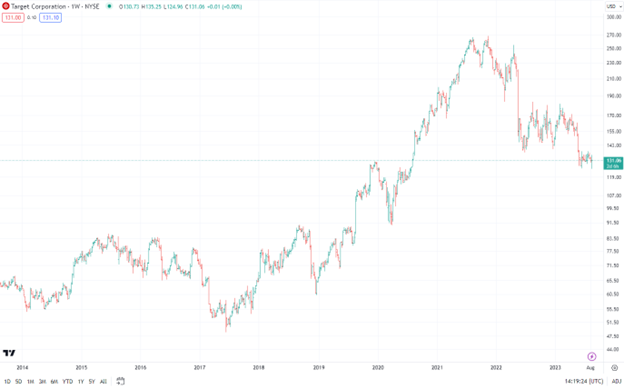There Is No New Bull Market in Retail Stocks, And Target (TGT) Stock Proves It


The narrative around the strength of the consumer economy is, simply put, nonsense. The reality painted by retail stocks, particularly the SPDR S&P Retail ETF (NYSEARCA:XRT), is quite different. Does this look like a chart that is in a “new bull market?”
Man – that new bull market in retailers is really something. $XRT pic.twitter.com/c9baCY2Prc
— Michael A. Gayed, CFA (@leadlagreport) August 16, 2023
I don’t buy it. With surging credit card rates, student loan payments resuming, and revolving credit at new highs, it’s only a matter of time until consumers really start to pull back hard. The longer rates stay elevated and the more that consumers totally disregard the cost of capital, the more painful and sudden a pullback in consumer spending likely becomes.
TGT Stock: Target Earnings Paint Grim Retail Picture
Target (NYSE:TGT) is a good reminder of this. Yes, the stock is doing well as of this writing, but top-line revenue came in below expectations, suggesting there just isn’t as much spending going on as the Street anticipates. Despite posting a surprising surge in profit, the company lowered its full-year forecast, signaling concerns about the rest of the year. The company’s adjusted earnings quadrupled during the quarter, reflecting a significant reduction in the bloated inventories that led to deep markdowns in 2022.
Sales have been a significant concern for Target. The company reported a revenue decline, its first in four years. The total revenue dropped about 5% from $26.04 billion a year ago. The comparable sales, a critical metric that tracks sales online and at stores open at least 13 months, declined 5.4%, a sharper fall than the 3.7% drop analysts expected.
Target is a symptom of a larger problem when it comes to a tired consumer. But there’s more risk still.
Another significant headwind that consumers are set to face is the resumption of student loan repayments. The pause on student loan repayments, in place since the start of the Covid-19 pandemic, has provided some financial relief to borrowers. However, with repayments set to resume, consumers will have to readjust their budgets, potentially leading to reduced spending on discretionary items.
The resumption of student loan payments is likely to put additional pressure on already strained consumer budgets. This could lead to a further decrease in spending in the consumer discretionary sector. Target CFO Michael Fiddelke noted that new headwinds, such as the resumption of student loan repayments, are likely to materialize in the coming months. He also added that it’s prudent to be cautious right now given these potential challenges.
The Bottom Line on Retail Stocks
As the weakening revenue trend in the consumer discretionary sector and the impending resumption of student loans show, the road ahead might be tough for companies like Target.
As such, it will be interesting to see how the company continues to navigate these challenges in the coming months. The situation also serves as a reminder for investors and other stakeholders to keep a close eye on these trends, as they could have substantial implications for the broader retail sector and the economy as a whole.
On the date of publication, Michael Gayed did not hold (either directly or indirectly) any positions in the securities mentioned in this article. The opinions expressed in this article are those of the writer, subject to the InvestorPlace.com Publishing Guidelines.









